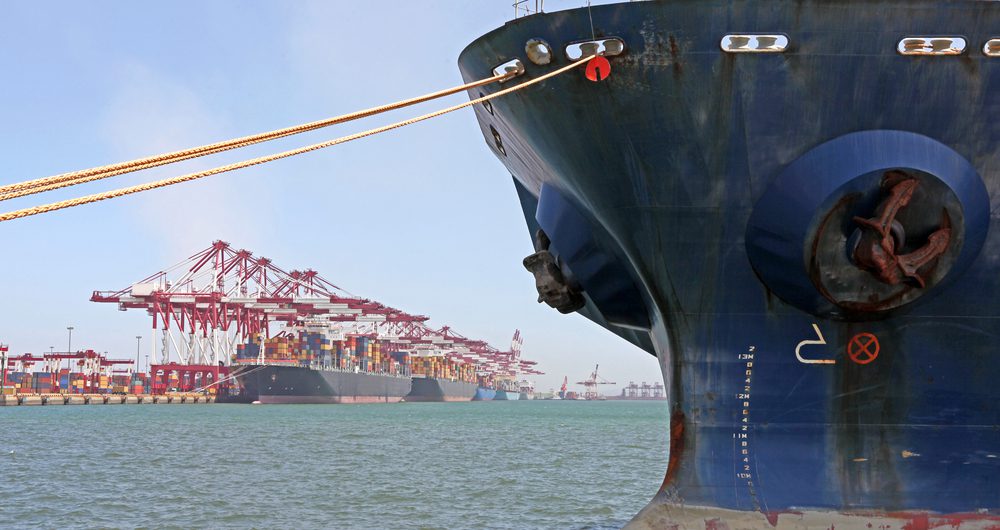Boskalis to Fully Acquire Smit Lamnalco
Royal Boskalis B.V. (Boskalis) has signed an agreement to acquire the remaining 50% shares in Smit Lamnalco, thereby taking full ownership of the company. Smit Lamnalco, known for providing terminal...


Photo: tcly / Shutterstock
By Mike Wackett (The Loadstar) –
The number of carrier-controlled container vessels in lay-up is increasing exponentially as liner networks are rationalised to mitigate the significant downturn in demand.
According to the latest bi-weekly assessment by Alphaliner, in the two weeks to 10 October, the number of idled box ships jumped by 25 (112,161 teu) to a total of 76 vessels for 322,394 teu.
According to the consultant, these are are “ships without revenue-generating commercial activity, such as vessels in warm or cold lay-up” and some that are in between deployment and idled longer than normal.
The idle tonnage does not include vessels on blank sailings or ‘slidings’, as these will normally resume service after a delay of a week or so at their Asian loading port.
Moreover, ships made ‘redundant’ by the recent raft of temporary loop suspensions and mergers are not yet included, and therefore considerable spikes in the idle fleet numbers are likely over the coming months.
Nevertheless, the total number of inactive containerships, as counted by Alphaliner, stands at 275 (1,058,702 teu), which remains historically low, at 4.1% of the global fleet.
Reacting to a feared 25% downturn in consumer demand because of pandemic lockdowns, ocean carriers radically slashed capacity, and by June 2020 had mothballed hundreds of ships, creating an idle pool at a peak of 12% of the global container fleet.
Subsequently, demand from working-from-home consumers exploded as they spent money on home improvements and lifestyle items rather than on services, holidays and at restaurants, resulting in a two-year period of out-of-kilter vessel and equipment supply and huge freight rate inflation.
In their interim results earnings calls, carriers predicted a demand downturn in the latter months of this year, due to high energy costs and rampant inflation, but few expected the depth of the decline in bookings before the early October Golden Week holiday and, subsequently, the bleakest of outlooks thereafter.
Indeed, a carrier contact admitted to The Loadstar recently that forward-booking forecasts for Asia to North Europe were “dire”, and were as bad as he had seen since the start of the pandemic.
“Some of the booking forecasts recently have been so bad that they were initially rejected as being a computer glitch,” said the contact. “Unfortunately, they were accurate, and there have been some very senior network capacity meetings to decide what to do next.”
Indeed, until recently, ocean carrier alliances were content to roll out proven blanking programmes to adjust capacity and stop the rapid erosion of spot and short-term freight rates, which had begun to spill over to carriers’ bread and butter long-term contract rates.
However, so far, voiding sailings has failed to ‘stop the rot’ on the major Asia-Europe and transpacific tradelanes, and carriers are starting “temporary” loop suspensions and service mergers to address the imbalance.
Meanwhile, there is evidence of a fierce rate war developing on the major tradelanes, in contrast to the start of the pandemic when carriers adopted a judicious approach to pricing.
The Loadstar is known at the highest levels of logistics and supply chain management as one of the best sources of influential analysis and commentary.Join the gCaptain Club for curated content, insider opinions, and vibrant community discussions.


Join the 107,032 members that receive our newsletter.
Have a news tip? Let us know.
Access exclusive insights, engage in vibrant discussions, and gain perspectives from our CEO.
Sign Up




Maritime and offshore news trusted by our 107,032 members delivered daily straight to your inbox.



Essential news coupled with the finest maritime content sourced from across the globe.
Sign Up